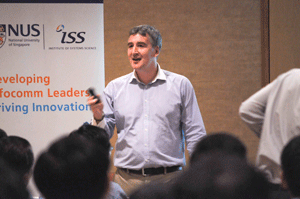In an age of frenzied change, what kind of organisation would make the cut?
Stuart Smith, Deputy Chief of Service Innovation ISS, tackled this topic at an IT Technology Radar seminar jointly organised by ISS and global software consultant ThoughtWorks.

Stuart from ISS, touching on the skills and qualities that organisations need to remain innovative and viable in this knowledge-driven age to some 80 IT professionals from the industry.
American venture capitalist Mary Meeker’s observation that this cycle of technology disruption is materially faster and broader than previous cycles was highlighted.
Stuart also pointed to three huge trends that make it ‘business as unusual’. The first is the shift from an asset-heavy economy to an asset-light one. The second is ‘disintermediation’ or the move to cut out the middleman with customers reaching out directly to the source and bypassing the retail component of the supply chain. The last is fragmentation with every customer becoming a unique ‘customer segment’. “People are now saying, “I want my individual experience. I expect things to be tailored for me,” expounded Stuart.
The bad news: Current management practices and organisation structures are not built to serve customers in this type of environment.
“What organisations need today is a 21st century DNA,” said Stuart. “This embraces a diverse spectrum of new skills and qualities and radically different mindsets.” Stuart shared the following:
#1. The ability to manage in real time. No one has been taught to manage in real time. But organisations must now learn to respond in real time because social media happens in real time and organisations get criticised on social media in real time.
#2. The attribute of authenticity. Social media provides individuals with a voice in public space that they didn’t have previously. By allowing voices from all parts of the globe to communicate with each other, social media shifts the power base from organisations to the ordinary people. “In this transparent age, you have to be authentic or you are going to get caught out by your customers,” said Stuart.
#3. The ability to hyper-innovate. In a world where anything can be copied in an instant, innovation is the only game in town. To be able to hyper innovate, organisations and individuals have to be knowledge seekers and be comfortable with complexity. “The world is a complex place. Deal with it and learn the tools,” pronounced Stuart. Quoting author Robert Heinlein, Stuart noted that “Specialisation is for insects”.
#4. A customer-centric mindset. Customers can change their loyalty immediately. On the other hand, they can also lift an organisation by co-creating products and services. To be customer-centric, you need to treat your customers like humans, advised Stuart.
To help organisations embrace the customer-centric path, ISS is launching a three-day User Experience Design course in March 2013. By fulfilling users’ underlying psychological needs, developers and engineers have a unique opportunity to create holistic design and champion greater innovation. Case scenarios, examples, exercises and workshops will be used throughout the course for participants to experience good and bad design. This course is intended for anyone with an interest or requirement to design or develop better digital user experience. Examples might include web application developers, traditional software developers, customer service and support teams, and in house development teams. In addition, IT or other managers who wish to get an overview of UXD and the key principles underpinning it.
For more information, please visit our website at www.iss.nus.edu.sg or contact Ms Swee Lee at 6516 2020 or email her at sweelee@nus.edu.sg.
Click here to read more about the Technology Radar Seminar.
Click here to subscribe to ISS mailing list.